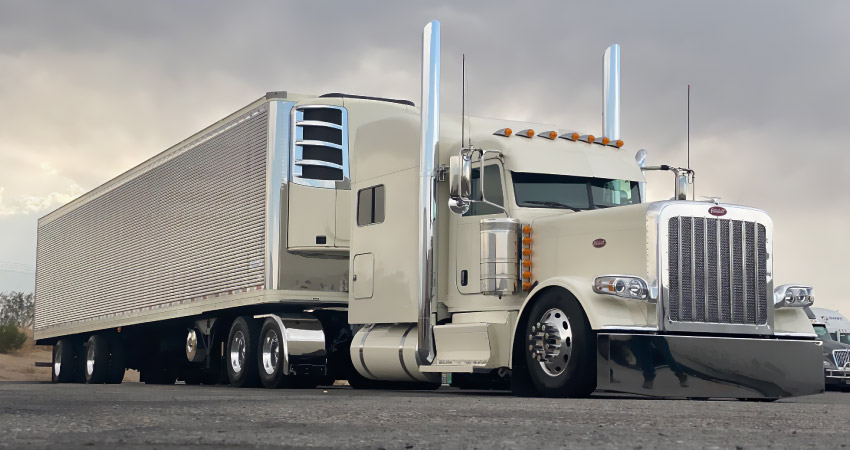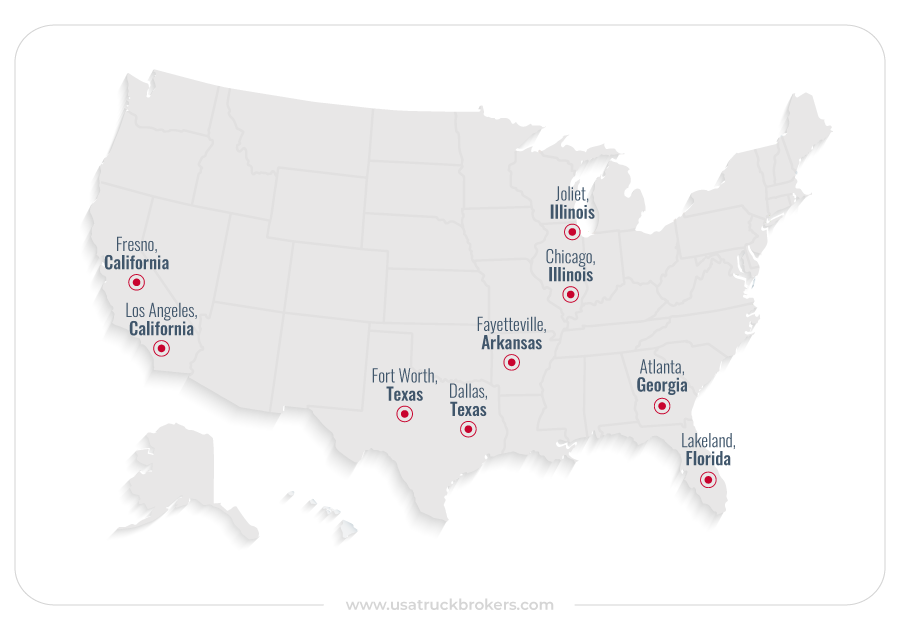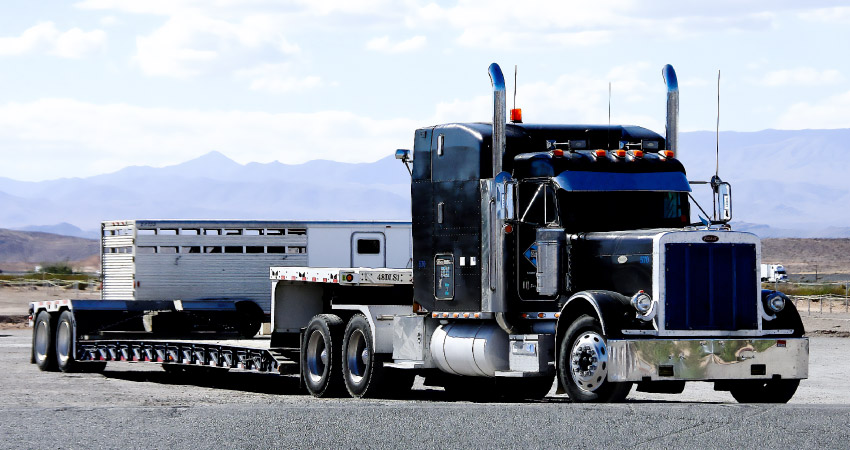

Refrigerated trucks, known as “reefers” (derived from refrigerators), are essential to transportation logistics in the United States. These specialized vehicles are the backbone of the distribution of temperature-sensitive products. Thanks to reefer trucks, various products, such as food and pharmaceuticals, are transported daily over long distances without perishing.
These vehicles can maintain the integrity of the cargo, whether it be under the scorching desert sun or amid heavy storms, ensuring that the products arrive intact at their destination thanks to their efficient refrigeration system.
Generally, these trucks’ bodies are made of metal or fiberglass, which makes them perfect for insulating the cargo, preventing moisture and odor absorption in their roof and walls.
What are the temperatures of a refrigerated truck?
Refrigerated trucks come equipped with thermal control systems capable of maintaining a wide range of temperatures, from -25 to 60 degrees, depending on the specific needs of the transported cargo.
In addition to their refrigeration system, these trailers have ventilation and insulation systems that ensure optimal conditions for cargo preservation.
During the trip, an internal device constantly collects temperature data from the trailer, displaying a detailed graph of the degrees Fahrenheit at which the cargo has been maintained. This tool not only gives the driver peace of mind by monitoring how the trip is progressing but also, in combination with the pulp thermometer, provides production companies with accurate information on the temperature of the products throughout the journey.
It is important to note that a reefer should not heat or cool cargo that wasn’t initially delivered at the correct temperature since it is not its function to modify the internal temperature but to maintain an environment conducive to its maintenance. It is essential to ensure the cargo is at the right temperature when loading the reefer truck, as it is designed to maintain the same temperature throughout the trip.
What kind of cargo is transported in a refrigerated truck?
In the trailer of a refrigerated truck, you can transport a wide variety of goods. Some of the most commonly transported products are:
- Fresh products such as fruits and vegetables
- Meat, fish and dairy products
- Bulk cargo
- Chemicals, pharmaceuticals, and cosmetics
- Flowers and plants
- Household appliances
- Technology parts
It’s vital to maintain the proper temperature for specific products. For example, meat and fish must be kept around 30°F to prevent thawing. At the same time, ice cream must maintain a temperature of -20°F to avoid melting.
Since each product has specific requirements, professional drivers must strictly follow the cargo specifications listed on the BOL (Bill of Lading) by their broker.
During the winter, refrigerated trucks are an excellent ally for customers who need to transport cold-sensitive cargo that cannot freeze for any reason. With a warm temperature, products such as paint, coffee, and certain chemicals will be safe under the four walls of a trailer. On the other hand, during the summer, these trucks ensure that frozen goods, appliances, and pharmaceuticals are kept cool and protected from the heat.
What are the cities in the U.S. with the most reefer trucks arriving and departing?

Entre las ciudades de Estados Unidos con mayor actividad de camiones refrigerados, donde la entrada y salida de mercancía sensible a la temperatura es constante, se encuentran:
- Atlanta, Georgia
- Chicago, Illinois
- Dallas, Texas
- Fort Worth, Texas
- Fresno, California
- Fayetteville, Arkansas
- Joliet, Illinois
- Los Angeles, California
- Lakeland, Florida
How do I keep my refrigerated cargo safe?
You must ensure that your logistics and transportation provider performs constant maintenance of the refrigerated equipment and checks the condition of the gear to avoid incidents that can result in losses for both parties. Proper temperature plays a crucial role in preserving the quality of refrigerated cargo during transport, so much so that even a tiny variation in Celsius degrees can make the difference between a product delivered in optimal condition and a spoiled load.
We share with you some key elements you must verify to ensure your logistics partner meets your required standards. This will give you complete trust that your products are being transported under perfect conditions:
- Air chutes: Air chutes allow air to circulate from the refrigeration unit at the front of the truck to the opposite end of the trailer. Installing them on a truck ensures air distribution and maintains a stable temperature range throughout the trailer. It is important to guarantee that the load is correctly distributed along the length of the truck to facilitate air circulation and avoid concentration in a specific area of the trailer. If the truck does not have air chutes, you can always use pallets to keep the circulation flowing.
- A good distribution of the load: Request some pictures or any proof that your cargo is well distributed along the trailer. It is only helpful for the truck to have all the necessary implements for the care of the load if it is correctly packed. For the air not to be concentrated only in one area of the trailer, the shape and patterns of the products to be transported must be taken into account so that they are correctly distributed along the length of the truck. Sometimes, it’s necessary to tie down the load to prevent product movement. In addition, the strategic use of load bars can be critical for maintaining stability and even weight distribution in the trailer. Your logistics and transportation provider will have to be very careful with separating products, avoiding raw food coming into contact with food ready to be digested or any chemicals coming into contact with the food.
- Thermometer/pulp thermometer: In many cases, the shipper or supplier of the cargo is responsible for ensuring that the goods are appropriately prepared for transport. This may include installing temperature monitoring devices, such as a pulp thermometer, to ensure that the cargo is kept within proper ranges during the voyage. Drivers, on the other hand, are generally responsible for ensuring that cargo is transported safely and in a timely manner to its final destination. The pulp thermometer is part of the equipment that monitors cargo temperature during transport. Once installed, the driver can use the pulp thermometer to keep track of the cargo’s temperature during the trip to ensure that it remains within the proper range.
- Cleaning, disinfection, and deodorization: A trustworthy logistics and transportation provider handles a trailer’s cleaning, disinfection, and deodorization. Some items transported may get watered or leave some residues on a trip. In addition, moisture will accumulate if the van is not constantly cleaned, which can contaminate your goods.
- Bulkhead: It’s possible to condition most trucks to transport loads that need to remain at different temperatures thanks to technologies. One of them is a bulkhead, a movable internal wall that divides the trailer into several zones. This wall makes it possible to create separate compartments within the trailer, each with its own temperature control, which is especially useful when transporting products that need specific conditions.
At Coal Port Logistics LLC, our drivers are equipped with these tools. They are dedicated to applying these measures on a daily basis to ensure that your cargo is transported under the best conditions and that it reaches its final destination in a perfect state, preserving the cold chain.
LTL for refrigerated cargo?
If you are looking for a low price and your merchandise comes in low volume,
i.e., less than 20 pallets, LTL (Less than truckload) mode of cargo transportation is the perfect solution for you. However, it is essential to understand the advantages and potential disadvantages of this type of transportation.
First, flexibility is one of the strengths of LTL. It allows you to ship smaller loads and share space on a truck with other goods. This flexibility can be beneficial when you don’t have enough cargo to fill a full truckload.
In addition, sharing truck space with other freight often results in lower shipping costs than using a full truckload. This cost reduction can be a deciding factor for those looking to optimize their transportation budget.
However, it is important to note that transit time may be slightly longer in LTL mode. This is due to the need to load and unload cargo at different pickup and delivery points. Although it may delay delivery, the economic benefits compensate for this short wait.
Another aspect to consider is the additional handling that cargo may experience when sharing space with other goods. This increased handling can increase the risk of damage or loss to refrigerated cargo, so it is vital to take extra precautions to protect the integrity of the products during transport.
FTL for refrigerated cargo?
Suppose you want a more customized, faster, and more efficient cargo transportation service. In that case, you should consider the Full Truckload (FTL) modality of cargo transportation, where your cargo will be transported in a single truck.
In FTL mode, transit speed is one of the main benefits. FTL loads tend to have faster transit times than LTL.
Another benefit of FTL is the shipper’s total control over the load and the transportation process (in this case, your company). By occupying a full truckload, the shipper has the certainty that his cargo will travel directly from one point to another without unnecessary intermediate stops.
However, it is important to note that FTL mode of cargo transportation may have higher shipping costs than LTL mode. This is because you pay for the exclusive use of the truck, which can result in higher rates for smaller loads.
In addition, if the load does not fill the truck, there may be a waste of space and resources. It is crucial to optimize the load to make the most of the available space and avoid unnecessary costs.
Start growing your business and distribute your products with UTB!
Coal Port Logistics LLC has an extensive network of carriers, each equipped with vehicles in optimal conditions to maintain temperature constantly or cyclically, as required by the cargo, the product, and the destination. Our carriers know the ideal temperatures for each occasion, ensuring product integrity throughout transportation.
Look no further if you want to amplify your products’ distribution, reach new states/cities, and move refrigerated cargo with the aid of experts! Get in touch with one of our experts at dispatch@coalportlogistics.us.
















